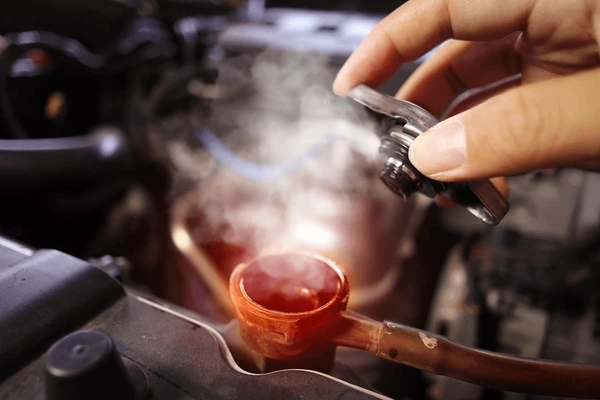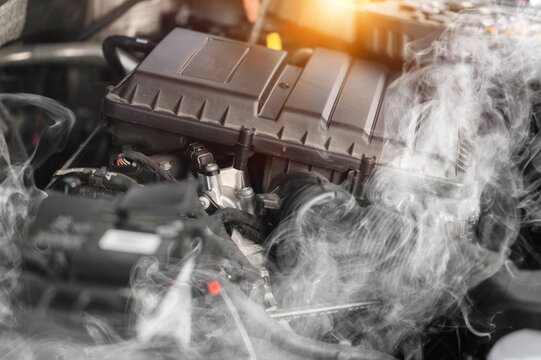Vehicle overheating is a rather common phenomenon in Ghana. Driving under the African scorching sun can impose a strain on your automobile and its engine, causing it to overheat. Overheating generally occurs when the engine gets hotter overriding what the cooling system can handle. Firestone Complete Auto Care describes the process as “something wrong within the car’s cooling system, causing heat to be unable to escape the engine compartment.” A system called coolant or antifreeze absorbs excessive heat from the car’s engine to keep it relatively cool and running, but if this coolant has a leak or is clogged, it’s not able to perform its duty properly, thereby causing overheating and a plethora of other faults.
Although internal issues such as a broken water pump or a stuck thermostat can lead to overheating, external and climatic factors such as hot weather and heavy traffic can exert extra strain on your automobile and either cause it to overheat or worsen an already overheated vehicle.
As a car owner or driver, you can easily reduce the likelihood of overheating by running routine checks on your water pump and engine, but let’s discuss the causes, some practical measures you can undertake in case the unfortunate happens and your car decides to bail on you when you need it most – trust me, I’m speaking from experience.

Why Your Car Overheats
Low engine oil
Engine oil lubricates the internal components of the engine, minimising friction and therefore heat. After checking coolant levels, you should also check your engine oil and investigate for signs of a leak. If your oil looks particularly dark or dirty, or you have noticed a knocking noise coming from your engine, this could indicate your oil needs changing.
Cooling system failure
If your engine is overheating but the coolant is full, there may be an issue with the radiator or cooling system as a whole. This could be caused by anything from a mechanical fault of the radiator fan to a damaged expansion tank.
In this case, you will need a professional mechanic to find and fix the issue, so you’ll need to call for breakdown assistance.
Engine problems
There are several different engine issues that may cause your vehicle to overheat, from problems with the belts and hoses that manage air and coolant flow to and from the engine, to a clogged heat exchanger unit.
Since you won’t be able to tell which of these is causing your car to overheat, you’ll need to call for professional assistance from a roadside mechanic. But let’s discuss some measures you can take if your car overheats while driving.
Pull Over Safely
Pulling over and parking safely should be the first thing that should come to mind when a driver is caught in a situation of this nature. This is the avert further damage to your car which could lead to an accident.
Turn Off the Air Conditioning and Open the Bonnet Immediately
The air conditioning adds strain to your engine and may potentially worsen the situation. Afterward, open the car’s bonnet to enable the engine to cool even faster and halt any potential damage to it. You must, however, exercise caution when touching any parts with your bare hands due to the heat generated from the engine.
You should stay away from your bonnet once you open it. You can inspect your car after 20 to 30 minutes after the heat has degenerated. This is especially important in Ghana’s high temperatures, where a hot engine can cause burns or injury if handled too quickly.
Your Mechanic Should Be Your Best Friend
Well, I don’t mean it in the literal sense, but if you don’t have a lot of driving experience, especially, maintaining a very cordial relationship with your mechanic will save you from a lot of stress in an already stressful climate. After the engine temperature has normalized, you should call your mechanic. You can also check your vehicle’s coolant levels if you’re a more experienced driver who has faced this experience before. If you notice a leak in the coolant, calling your mechanic should be the next step. Your car should be back on the road in no time.

How Do You Prevent Overheating?
Regular vehicular maintenance is the best way to prevent your engine from overheating, and for those of us in the climatic regions, maintenance should be at the top of our priority list. You could also adopt some practical tips to help you stay ahead of overheating. Checking your coolant levels often and ensuring there are no leaks is a good place to start. You should also change your engine oil on time and ensure your radiator and water pump are in good condition.
Overheating is one of the most common car-related issues in Ghana’s hot climate, but a prudent and conscientious driver will always be ahead and spot the danger signs even before it happens. But despite all the precautionary measures, a car will always surprise you in one way or the other. When that happens, don’t panic. Just implement the measures I’ve outlined, and you and your baby should be back on the road in no time!




